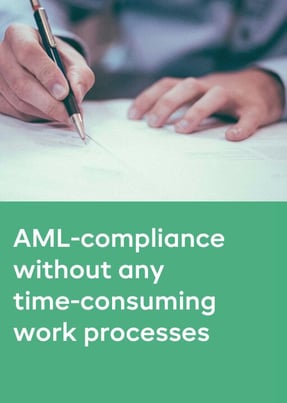Reglab's funds x sales team

Summary
Onboarding new clients can be a big hassle. To make everything run as smoothly as possible, it is important for you to be compliant with the rules and legislation surrounding AML. In this five-part blog series, we take you through key segments in which team RegLab operates. In this first blog post, we will focus on team funds x sales. We will look at the main struggles that companies encounter.
High demand for speedy onboarding
Not only do lawyers or banks have to deal with AML legislation, but it is also important for investment funds. For the funds field, RegLab focuses on venture capital and private equities across the Benelux region. This field is very different from the legal profession. In general, the focus here is more on a business perspective with seamless application operation for onboarding new clients. For this reason, we have chosen to set up the application so that it runs smoothly for funds for both young professionals and more experienced professionals in this field.
AML should remain a priority
You are probably already very busy with day-to-day business tasks. This probably makes complying with AML a low priority. However, as an investment firm, it is very important to master the basics of AML and therefore to limit the impact of a visit from the regulator. It would be very unfortunate if you do not have the right knowledge which could result in receiving a hefty fine.
We can help you prepare for a visit from the regulator, just to go through the fundamentals again. With experts who know the rules in depth, you won't face any surprises. We can give you advice on how to better deal with misunderstood topics or small problems you may encounter more frequently. We can also tell you more about the visits and ways to start the conversation. Focusing your attention on AML from time to time will save you a huge amount of time and stress when preparing for a supervisory visit.
💡 Did you know that a visit of the regulator is more frequent in the Netherlands than anywhere else in Europe?
Know the guidelines
The guidelines associated with the Dutch Money Laundering and Terrorist Financing Prevention Act (Wwft) and the Sanctions Act of 1977 (Sanctiewet) provide detailed instructions and recommendations for compliance with these laws. It is therefore of importance that you know the content of the guidelines. To support this article, team Funds x Sales has written a short summary of the guidelines:
Dutch Money Laundering and Terrorist Financing Prevention Act (Wwft)
- Scope and Definitions: The guidelines clarify the scope of the Wwft and provide definitions of key terms to help entities understand their obligations under the law.
- Customer Due Diligence (CDD): Detailed procedures are outlined for conducting customer due diligence, including identifying and verifying the identity of customers, assessing the nature and purpose of customer relationships, and monitoring transactions.
- Risk Assessment: Entities are required to conduct risk assessments to identify and evaluate the risks of money laundering and terrorist financing associated with their business activities.
- Reporting Obligations: Guidelines specify the types of transactions and activities that trigger reporting obligations, as well as the procedures for submitting suspicious transaction reports to the authorities.
- Record-Keeping Requirements: Detailed requirements are provided for maintaining records of customer transactions, CDD measures, and suspicious activity reports for a specified period.
- Internal Controls and Compliance Programs: Guidelines may outline recommendations for establishing internal controls, policies, and procedures to ensure compliance with the Wwft.
Sanction Act of 1977 (Sanctiewet)
- Scope and Purpose: The guidelines explain the purpose of the Sanctiewet and its role in implementing and enforcing international sanctions imposed by the Netherlands.
- Sanctions Compliance: Entities are provided with guidance on complying with sanctions imposed by international bodies, including procedures for asset freezing, travel bans, and other restrictive measures.
- Notification Requirements: Guidelines may outline requirements for notifying relevant authorities of transactions or activities that may be subject to sanctions.
- Risk Management: Recommendations may be provided for assessing and managing the risks associated with sanctions violations, including conducting due diligence on counterparties and screening transactions against sanctions lists.
- Enforcement and Penalties: Guidelines may outline the enforcement mechanisms and potential penalties for non-compliance with sanctions regulations.
About Natalie
Natalie is a Client Portfolio Manager at RegLab. On a daily basis, she works with investment firms to ensure the integrity of Wwft policies. With her foresight and extensive experience, she is a strong sparring partner. She is the go-to consultant for all clients within her portfolio!
Next up
In the next blog, we will meet Reglab's compliance team. In it, we will elaborate on issues they encounter and key highlights that clients have expressed their contentment with. Here, the questions will come from a more detailed interest about the law rather than practical purposes.






